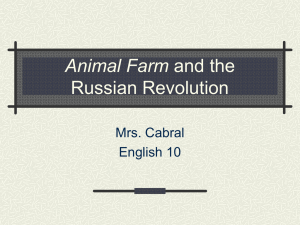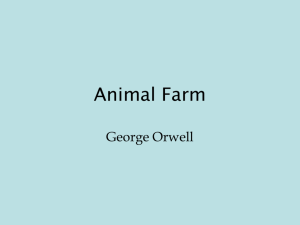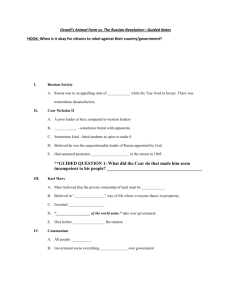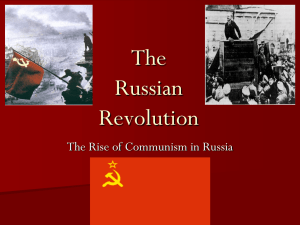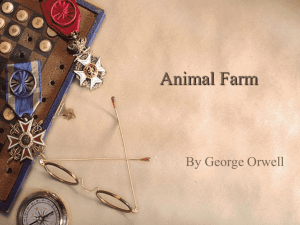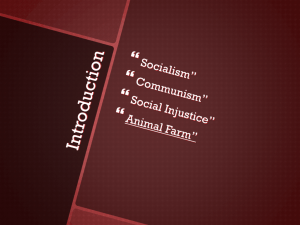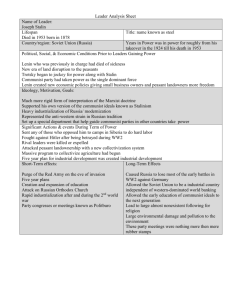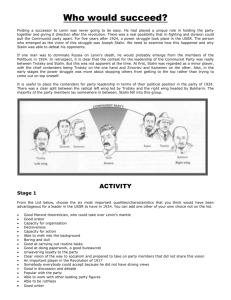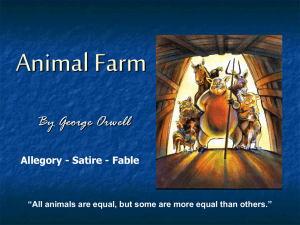Animal Farm
advertisement
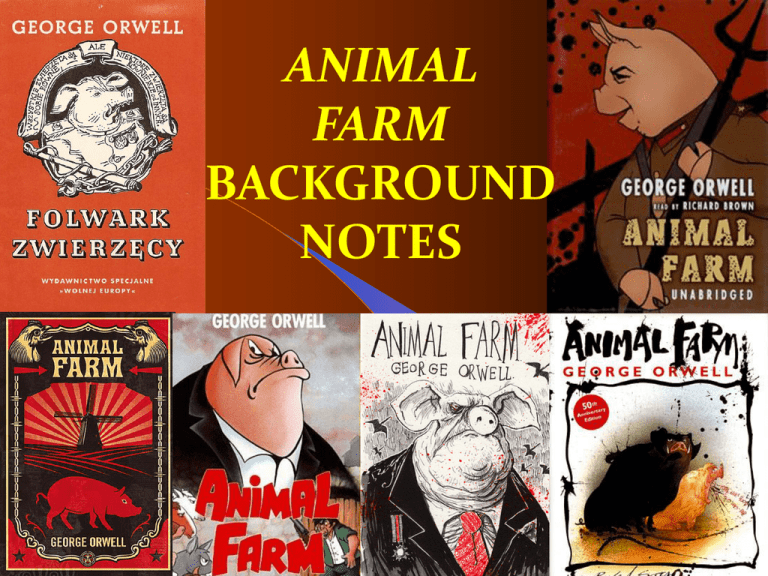
ANIMAL FARM BACKGROUND NOTES AUTHOR BACKGROUND George Orwell is the penname or pseudonym for Eric Arthur Blair Born in Bengal, India in 1903 while it was under Imperialist rule His family was of the lower part of the upper-middle class ORWELL’S SCHOOLING Attended everywhere on scholarship because of his family’s financial struggles Went on to Eton, but instead of continuing on with university classes he joins the Indian Imperial Police His school experiences taught him about the inequality/oppression of social classes IMPERIAL POLICE (BURMA, INDIA) Gave him a view from the top as he enforced the law over the Indian citizens Felt a growing anger towards his own class as an imperialist (continuing the cycle) Resigns after 5 years and returns to London 1923 Burma Provincial Police Training School, Mandalay (Eric Blair standing third from the left) LONDON, PARIS, & SPAIN London & Paris – works as a teacher, tutor, & dishwasher – lives amongst the poor by choice – begins career as writer – changes name to protect parents – establishes political viewpoint Spain – writes about Spanish Civil War, joins fight – sees the ills of communism “WHY I WRITE” Orwell wrote in 1946, “every line of serious work that I have written since 1936 has been written, directly or indirectly, against Totalitarianism and for Democratic Socialism.” MOST KNOWN WORKS Finished writing Animal Farm in 1943, but wasn’t published until 1945 because the Soviet Union was an ally of Britain in WWII Completed 1984 before his death in 1950 due to tuberculosis ANIMAL FARM LITERARY TERMS ALLEGORY – a narrative that can be read on more than one level. The events and characters have hidden or symbolic meanings FABLE – a narrative that attempts to reinforce a truth or lesson by using animals as the main characters PARABLE – a brief story teaching a moral or lesson SATIRE – attacks a serious issue by presenting it in a ridiculous light or poking fun at it Animal Farm is a literary metaphor of the human condition which brings together the important themes of: – Politics – Truth and falsehood – God and religion – Human rights – Class conflict Animal Farm was written as an allegory of the Russian Revolution and its aftermath. ANIMAL FARM HISTORICAL PARALLELS PRE-REVOLUTIONARY RUSSIA Nicholas II became Czar in 1884 – Believed he was the absolute ruler anointed by God – Paid no attention to the Duma Russo-Japanese War (1904) – defeat led to political instability Rapid growth of the discontented working class Little help from the countryside because they were mainly impoverished peasants who had no individual land ownership and were dealing with rural famine World War I is the last straw for many revolutionaries – Revealed the ineptitude and arrogance of the country’s aristocratic elite – Corrupt military leadership had contempt for ordinary Russian people – Average peasants had very little invested in the War RUSSIAN REVOLUTION Began in 1917 as a conflict between the Russian proletariat (working class) and the bourgeoisie (owners/middle class) The leaders of the revolution are Karl Marx and Vladimir Lenin The March Revolution – March 12th – Origins: Food riots/strikes – Duma declared itself a Provisional Government – Czar ordered soldiers to intervene; instead they joined the rebellion…the Czar thus abdicated the throne The November Revolution – November 17th – Lenin seized the Winter Palace, the seat of the Provisional Government – All private property was abolished and divided amongst the peasantry – The largest industrial enterprises were nationalized – Start of the Communist Party CZAR NICHOLAS II 1869-1918 Last of the Romanovs A poor leader at best, compared to western kings Cruel – sometimes brutal with opponents Sometimes kind – hired students as spies to make money After being forced to abdicate, he was executed by the Bolsheviks Represented by Mr. Jones in the novel KARL MARX Known as the Father of Communism – Has a vision of ending the exploitation of man by man – Wants a classless society and worker owned factories and farms Wrote Das Capital and Communist Manifesto – Most famous rallying cry for communism is the political slogan from CM: “Workers of the world unite!” Dies before the Russian Revolution VLADIMIR LENIN Lenin adopted Marx’s ideas. – Believed that the bourgeoisie exploited workers and must therefore be overthrown Involved in the Communist Party as the leader of the working class – Leader of Bolsheviks – forces Czar to abdicate throne Established Pravda because he understood the emotional impact of simple, powerful slogans Changed Russia’s name to the Union of Sovereign Soviet Republics (USSR) THE PIG, OLD MAJOR Represents both Vladimir Lenin Karl Marx LEON TROTSKY Led the revolution along with Lenin and Stalin Pure communist, followed Marx He is an idealist – One that places a high goal over practical things – wanted to improve life for all in Russia Noted as a brilliant speaker Represented by the pig Snowball – A snowball is symbolic of purity and impermanence JOSEPH STALIN Didn’t exactly follow Marx’s ideas Average speaker, not educated like Trotsky Was ruthless in his desire for power, even killing those who would oppose him Used the KGB and propaganda – Rewrote history and communist theories to benefit himself Represented by the pig, Napoleon TROTSKY & STALIN After Lenin’s death, Trotsky (Leader of Red Army) and Stalin (Lenin’s mouthpiece) compete for power Stalin wins Trotsky is exiled, deported, and later in his life assassinated – The exiled Trotsky was still very useful to Stalin as he now had Trotsky to blame for all the problems and difficulties that Russia suffered. THE PIG SQUEALER Part of Pravda, the propaganda department of the Communist government – Means “truth” Also the name of their Communist newspaper Worked for Stalin to support his image – Used any lie to convince the people to follow Stalin – Benefitted from the fact that education was controlled THE WORK HORSE BOXER Represents the common man of Russia or those dedicated, but tricked supporters – People believed Stalin because he was “Communist” – Many stayed loyal after it was obvious he was a tyrant Considered the hardest working animal on farm – Motto: “I will work harder” THE RAVEN MOSES Tells the animals of a magical place called Sugarcandy Mountain, a satire of heaven. Represents Rasputin, mystic monk with hypnotic powers – Influenced the Czar and his wife, throwing the government into chaos Also represents religion – Marx said it was the “Opiate of the people” – Religion was tolerated because it was used to make people not complain and do their work THE DOGS Represent the KGB or Secret Police – Not really police, but forced support for Stalin Used force, often killed entire families for disobedience Totally loyal THE FARM OWNER, MR. FREDERICK Represents German dictator Adolf Hitler THE FARM OWNER, MR. PILKINGTON Represents Prime Minister of England Winston Churchill Will Animal Farm ally with Frederick or Pilkington? • Stalin negotiated with both Germany and Great Britain. THE HORSE MOLLIE THE DONKEY BENJAMIN Represents the skeptical people in and outside of Russia Intellectual and Cynical – Weren’t sure revolution would change anything – Knew Communism wouldn’t work with power Could he represent Orwell? Represents the bourgeoisie, the luxury lovers – Vain, selfish people – Went to other countries that offered more for them THE SHEEP THE CAT Represent the masses, who blindly follow the leader Represent sneaky opportunists, who are people who take advantage of others for their own gain
